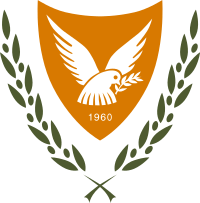Cyprus–United Kingdom relations
 |
|
Cyprus |
United Kingdom |
|---|---|
Cypriot–British relations are foreign relations between Cyprus and the United Kingdom. Cyprus gained its independence from the United Kingdom in 1961, after 83 years of British control. The two countries now enjoy warm relations, however the continuing British sovereignty of the Akrotiri and Dhekelia Sovereign Base Areas has continued to divide Cypriots. The two countries share membership of the Commonwealth of Nations.
The United Kingdom has a High Commission in Nicosia. From August 2014, the British High Commissioner to Cyprus is Ric Todd.[1] Cyprus has a High Commission in London, the current Cypriot High Commissioner to the UK is Euripides L. Evriviades.[2]
History
Cyprus gained its independence from the United Kingdom in 1961, after 83 years of British control. The UK was also a signatory to a treaty with Greece and Turkey concerning the independence of Cyprus, the Treaty of Guarantee, which maintains that Britain is a "guarantor power" of the island's independence.[3]
For four years after Cypriot independence, the British government supported the Republic of Cyprus financially, under the 1960 Exchange of Notes on Financial Assistance to the Republic of Cyprus.[4] Among other items, that Exchange of Notes provided for payment of a total of £12 million "by way of grant" (and not related to the bases), starting with £4 million in 1961 and tapering down to £1.5 million in March 1965, with provision for the UK government to review the situation for each subsequent 5-year period, in consultation with the Republic government, and "determine the amount of financial aid to be provided". After the intercommunal conflict of 1963–64 it stopped, claiming there was no guarantee that both communities would benefit equally from that money. The Cypriot government is still claiming money for the years from 1964 to now although to date has taken no international legal action to test the validity of its claim. Estimates for the claimed debt range from several hundred thousand to over one billion euros.
Modern relations
The two countries share membership of the European Union and Commonwealth of Nations. At the moment, there are 400,000 Greek Cypriots[5] and 300,000 Turkish Cypriots[6] living in the UK. There are at least 50,000 British who reside in Cyprus, with most having their property in Paphos district. Current relations between Cyprus and the United Kingdom are considered excellent with high levels of cooperation on energy, diplomacy and education. On 16 January 2014 President of Cyprus Nicos Anastasiades and British Prime Minister David Cameron reaffirmed the strong bonds of friendship and partnership between Cyprus and the UK, during a meeting at 10 Downing Street.
Akrotiri and Dhekelia
_(11962073444).jpg)
The continuing British sovereignty of the Akrotiri and Dhekelia Sovereign Base Areas has continued to divide Cypriots. Several Cypriot villages remain enclaved in the areas, and there have been numerous arrests of anti-British demonstrators over the past few years. These activists assert that the UK should not continue to hold territory in another EU state.
In January 2014, an agreement signed by Cypriot Foreign Minister Ioannis Kasoulides and Foreign Secretary William Hague, in the presence of President Nicos Anastasiades, was made to lift the restrictions in developing properties within the British bases areas. The right of the owners to develop their land concerns 15 local administrative units, which make up 78% of the total area of the bases. The agreement lifted all restrictions about eligibility and the development of properties within the British Bases so that all regulations applied in the Republic of Cyprus will be valid within the Bases areas, as regards purchasing and developing properties by European or third country nationals.[7]
See also
- Foreign relations of Cyprus
- Foreign relations of the United Kingdom
- National Federation of Cypriots in the United Kingdom
References
- ↑ "Ric Todd". Gov.uk. Retrieved 6 December 2014.
- ↑ "Welcome to our Website". Cyprus High Commission in London. Retrieved 6 December 2014.
- ↑ Sovereign Base Areas Cyprus
- ↑ Commonly referred to as "Appendix R" from the grouping in the set of papers presented to the UK Parliament - see Republic of Cyprus Government text
- ↑ Cole, Jeffrey (2011), Ethnic Groups of Europe: An Encyclopedia, ABC-CLIO, p. 92, ISBN 1-59884-302-8
- ↑ Home Affairs Committee (2011). "Implications for the Justice and Home Affairs area of the accession of Turkey to the European Union" (PDF). The Stationery Office. p. Ev 34.
- ↑ "British bases land development agreement". Cyprus Property News. Retrieved 6 December 2014.
External links
- British Foreign Ministry about relations with Cyprus
- British embassy in Nicosia
- List of Treaties between the 2 countries by the Ministry of Foreign Affairs of Cyprus
.jpg)

